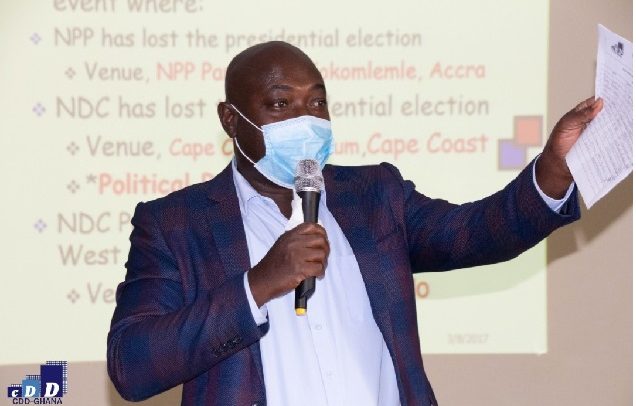Mr. William Nyarko
Some major political campaign financiers have been found to be engaged in Serious and Orgnaised Crime (SOC) activities, a new report released by the Centre for Democratic Governance (CDD-Ghana) on political campaign financing in the country has shown.
According to the study, “Understanding How Illicit Money Fuels Campaign Financing In Ghana” specific sources of funds identified as money from illicit activities include illegal mining, illegal oil diversion, and kickbacks from procurement of goods, services, and work contracts and from proceeds of organised crime.
Also, majority of campaign financiers provided their funds with the expectation of receiving some form of reward such as procurement favours in the form of works, services, and construction contracts; appointments; protection of businesses; protection from prosecution in the case of illegal activities; tax waivers; and access to power.
The study which adopted a three-tier approach including the analysis of 40 media reportage of contributions to the National Democratic Congress (NDC) and New Patriotic Party (NPP) spanning elections in 2000 to 2016, also showed that the source of campaign financing is dominated by high-profile political personalities at both national and local levels; accounting for a little more than half (52.5%) of all the sources of contribution observed in our analysis.
Lead Consultant, CDD-Ghana Campaign Financing Project, William Nyarko, said nine financiers were found to be involved in illicit and Serious and Organised Crime (SOC) related activities while 10 of the financiers are engaged in the procurement of works (construction of roads and buildings) and three of the major financiers are chiefs in the Eastern Region.
Mr. Nyarko said the least commonly mentioned sources of contributions were organic grassroots membership fundraising (12.5%); corporations (2.5%); and foreign entities (2.5%).
“The type of contribution or support political parties were commonly reported to have received were non-monetary (48%) ranging from the provision of buildings, cars, motorcycles, phones, stationery, and bales of second-hand clothing.
“Majority of the contributors (23 out of 40 contributors) are from the upper echelons of the political elite (political party official, 20.5%; former government official, 18%; current government official, 15.4%; and parliamentarian, 2.6%),” he said.
Mr. Nyarko said the gaps in the legal and regulatory framework and oversight of campaign financing in Ghana was found to be the enabler in the inflow of money from illicit sources into Ghanaian politics.
He further noted that high cost of running for elections is exacerbating exclusionary politics and preventing the reforming of the status quo. This, in turn, is inhibiting real change actors to enter the political arena and drive influential changes for positive developmental outcomes.
“Interviews with party informants, past and current candidates and MPs revealed that aspirants/candidates have to nurture the constituency for a number of years, spending on voters in the constituency and financing the campaigns for the election of party executives and coordinators in the constituency nearly three years before they contest in the primaries, which we estimated at GH¢2 million.
“A further estimated GH¢2 million is spent during the run-up to the primaries, bringing the total estimated amount to GH¢4 million ($693,000) which is up from up from GH¢389,803 ($85,000) CDD-Ghana and WFD study in 2018,” he said.
He said less than one per cent of funding for campaign (political) activity originated from membership dues/subscriptions due to irregular payments. This, however, contradicts to the nearly 50% income the two parties have reported in the returns and audited statements submitted to the EC.
Meanwhile, cash amounts donated by special interests and business financiers in support of the candidature of a presidential candidate ranged from GH¢40,000 to GH¢11.5 million ($2 million).
Other funding sources include voluntary contributions; donations; funds from short codes, foreign donors, administrations, businesses and fundraising activities in Ghana and overseas.
The report recommended that the Political Parties Act must be amended to include prohibition of funding with illicit sources and donations must be tax deductible to encourage transparency.
“The EC and political parties must adopt a formula to determine the rate of increment in filing fees. Political parties must reconsider the candidate selection process to mitigate the cost implication in primaries, and candidates must be required to file returns as it in the case of the political parties,” the report said.
By Jamila Akweley Okertchiri


